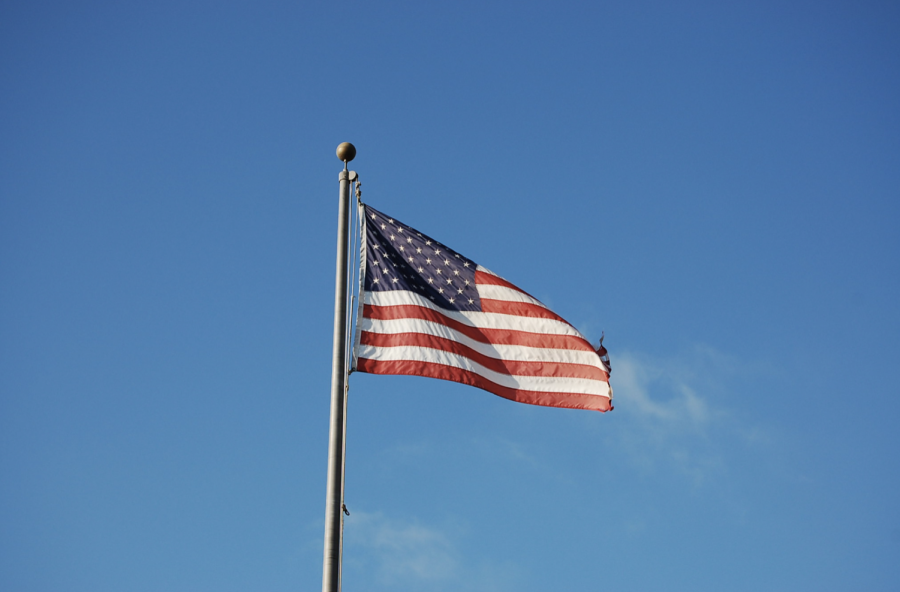The Change in Heart Toward the Pledge of Allegiance
The United States Flag
December 19, 2022
Every morning at 7:20 am, Mr. Donovan asks the students and staff at DHS to stand for the Pledge of Allegiance. Standing for the pledge has been an ongoing act for students since its debut in 1892. Though what started with an entire class of students standing has come down to a handful of individuals who still decide to acknowledge it. Why has there been such a sudden change in students’ feelings towards the pledge and their decision to stand during it? What some believe to be a simple patriotic verse has been able to cause much controversy across the country?
Many people see standing during the pledge as a sign of patriotism and respect toward the country. Though just because it has a sense of nationalism and pride for some, it may not have the same meaning to others. Social Studies teacher Heather Lorenz knows that the basis for why the pledge was created is one that’s based on racism. So even though the pledge might not mean much to her, she still stands during it in respect to her nation and the ideals of a society that will one day be equal and equitable. She believes that if students learned the basis for the pledge, there would probably be less support for it than there already is.
“I think it’s important for people to recognize the fact that this country provides them a certain type of life and lifestyle,” said math teacher Todd Harris. “It is always good to give thanks for things in life regardless of what your beliefs are. I believe that people should be proud to be Americans or people who moved here recently and want to become citizens should be proud that they moved here.”
The importance of the pledge can be a debatable topic. Many argue that the Pledge of Allegiance is not a true reflection of today’s society, it does not reflect the nation’s reality. Various students at DHS expressed their disappointment with the country’s actions which has caused them to stop giving their support towards the pledge. Whether a student stands or decides to sit during the pledge all comes down to the beliefs and experiences of that individual. What is important is for students to be more conscious of their actions and understand that the choices they make in the real world will reflect their character. While teachers can’t force their students to stand up during the pledge, they can ask them to show respect for those that do.
“I think the act of actually standing up, getting up from your seat, is not as important as paying respect to the country, the flag, and the pledge in general,” said Social Studies teacher Mathew Franco. “I do not make my students stand up for the pledge if they do not want to, but what I do make them do is I ask them to remain silent. I ask them to respect the people that do decide to stand up for the pledge because you have to show respect to those people.”
Teachers at DHS believe that the undivided attention that students pay to their phones is a main reason why most of them no longer stand during the pledge, following the fact that most are too distracted, sleepy, and lazy to care for it. Mr. Franco argued that while students claim they don’t stand during the pledge because of certain beliefs, he feels that most of them would be unable to explain the reason behind their actions clearly. Therefore, he believes that it’s important for students to understand why they aren’t standing. Mr. Harris mentioned that he acknowledges that some students have faced disrespect from the country, and he respects their choice to remain seated during the pledge but wishes that there would be more people who stood. Meanwhile, Ms. Lorenz touched on the point that students don’t find meaning to it in their lives and are no longer buying into it. Several students at DHS got the opportunity to express their thoughts on the pledge and explain why they stand or remain seated during it.
Most students at DHS claim they come from another country and have not spent most of their lives here, making it hard to understand the pledge’s meaning. Students talked about never being educated on the pledge and how they feel nothing towards it. Others emphasized that it’s a choice and not an obligation to stand during the pledge and that they are too tired and lazy in the morning to care for it. Many students claim that most kids in their classes remain seated and they don’t think that such an act should be seen as a sign of disrespect towards the country.
A deeper meaning for the student’s actions has a lot to do with the fact that the pledge doesn’t reflect our current society. Many students don’t stand with the country’s actions and don’t support what the pledge says. A student argued that the phrase “under God” in the pledge diminishes the idea of separation of church and state. The phrase “liberty and justice for all” also causes much controversy, with students claiming that it doesn’t apply to all, knowing there’s some violence and hate against some races and genders. The idea of the United States not being an equal country and being unable to protect everyone’s rights the same way is what has stopped many students from supporting the Pledge of Allegiance.
While most students remain seated, there are those who still stand for the pledge. Students talked about how blessed they feel to live in America, a country that has provided their families with various opportunities, constitutional rights, as well as a stable life. They claim that the most you could do as a student for this country is to stand during the pledge. Many of these students stand during the pledge not necessarily to respect the country but honor the soldiers who risk their lives to ensure our safety.
A student at DHS said, “Many defend the flag saying many soldiers died for the flag, no they died for the people. The flag does nothing except exist, it isn’t an action, just a symbol. If people want to help veterans, donate money, many are homeless. If you want to help, don’t just stand for a flag that means literally nothing for the people, do something. This flag is for the government which has oppressed everyone, but cis-white men.”
The importance of standing during the pledge is a highly debated topic. Whether students stand or remain seated during the pledge, respecting their decision is important. Students are old enough to make their own decisions, but as young adults, they should always keep in mind if their actions will truly represent their character. The students that stand should never feel ashamed of being one of the few that do, while the students who remain seated should never feel obligated to support something they don’t believe in. Those who want change in the country must fight for that change themselves and understand that even the smallest progress contributes to a better future for many.




































